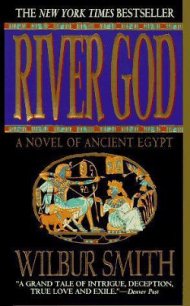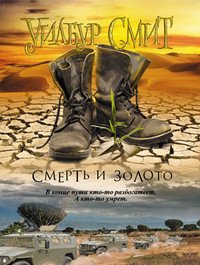Men of Men - Smith Wilbur (онлайн книга без txt) 📗
Bazo gave a single blast on the buckhorn whistle that hung on a thong at his throat, and the spearsmen froze.
The charge stopped dead on the instant, and the Matabele trotted back to where they had dropped their baggage, all of them grinning with delight; as they formed up again, Bazo sang the first line of the Inyati regimental war chant in a high ringing voice: "See the war shields black as midnight, white as the high storm clouds at noon And the men behind him came crashing in with the chorus: "Black as the Inyati bull, white as the egrets that he carries upon his back The entry of the little band of warriors to the New Rush diggings became a triumphal procession. Riding at their head Zouga felt like a Roman emperor.
Yet not one of the young warriors had ever swung a pick or hefted a shovel. Jan Cheroot had to place the tools in their hands, positioning their fingers correctly on the handles, all the while muttering his disdain of such ignorance. However, they had the knack of it within minutes, and the velvety black muscles, forged in war and the training for war, changed the mundane tools into lethal weapons; they attacked the yellow earth as though it were a mortal adversary.
Confronted with a wheelbarrow for the first time, two of them lifted it bodily and walked away with it and its contents. When Ralph demonstrated the correct use of the vehicle, their wonder and delight was childlike, and Bazo told them smugly: "I promised you many wonders, did I not?"
They were a highly disciplined group of young men, accustomed since childhood firstly to the strict structure of family life in the kraals and then from puberty to the communal training and teamwork of the fighting regiments.
They were also fiercely competitive, delighting in any challenge to pit their strength or skill against one another.
Zouga, knowing all these things, organized them in four teams of four men, each named after a bird, the Cranes, the Hawks, the Shrikes and the Khorhaans, and each week the team with the best performance in lashing the gravel was entitled to wear the feathers of their adopted bird in their hair and to a double ration of meat and mealie-meal and twala, the African beer fermented from millet grain. They turned the work into a game.
There were some small adjustments to be made. The Matabele were cattle-men, their whole lives devoted to raising, protecting and enlarging their herds, even if these expansions were often at the expense of their less warlike neighbours. Their staple diet was beef and maas, the calabash-soured milk of the Nguni.
Beef was an expensive item on the diggings, and it was with patent distaste that they sampled the greasy stringy mutton that Zouga provided. However, hard physical labour builds appetites, and within days they were eating this new diet if not with relish at least without complaint.
Within those same few days the labour was apportioned and each man learned his task.
Jan Cheroot could not be inveigled down into the workings.
"Ek is near meerkat nie," he told Zouga loftily, reverting to the bastard Dutch of Cape Colony. "I am not a mongoose; I do not live in a hole in the ground."
Zouga needed a trusted man on the sorting-tables, and that was where Jan Cheroot presided. Squatting like a yellow idol over the glittering piles of washed gravel, the triangular shape of his face was emphasized by the scraggy little beard on the point of his chin, by the high oriental cheekbones and slanted eyes, each in their spider-web of wrinkles.
He was quick to pick out the soapy sheen of the noble stones in the piles of dross, but there was another pair of eyes sharper and quicker. Traditionally the women made the best sorters, but little Jordan proved immediately to have an uncanny talent at picking out diamonds, no matter what their size or colour.
The child picked the very first stone from the very first sieveful. It was a minute stone, twenty points, a fifth part of a carat, and the colour was a dark cognac brown, so that Zouga doubted its integrity. But when he showed it to one of the kopje-wallopers, it was a veritable diamond and the buyer offered him three shillings for it.
After that nobody questioned Jordan, instead a doubtful stone was passed to him for judgement. Within a week he was the Devil's Own chief sorter.
He sat opposite Jan Cheroot at the low metal table, almost the same size as the Hottentot. He wore a huge sombrero of platted maize stalks to protect his delicate peachlike skin from the sun, and he sorted the gravel as though it were a game of which he never tired. Competing with Jan Cheroot avidly, a high-pitched shriek of excitement signalled each discovery, and his neat little hands flew over the gravel like those of a pianist over the ivory keyboard.
Zouga had found a woman to give both Ralph and Jordan their lessons. The wife of a Lutheran preacher, she was a plump-breasted, sweet-faced woman with irongrey hair swept up into an enormous bun at the back of her head. missis Gander was the only schoolmistress within five hundred miles, and for a few hours each morning she gave a small group of diggers" children their reading, writing and arithmetic in the little galvanizediron church at the back of Market Square.
It was a daily ritual to which Ralph had to be driven by his father's threats, and to which Jordan hurried with the same enthusiasm as he did to the sorting-table after school was out. With his angelic looks, and the intense interest in the written word that Aletta had germinated in him, Jordan was instantly missis Gander's darling.
She made no effort to conceal her preference. She called him "Jordie-dear" and gave to him the task of wiping clean the blackboard, which immediately made it an honour for which the dozen other children in the class would have scratched out his lovely densely-lashed angel eyes.
There was a pair of twins in missis Gander's class. The tough sons of a tough out-of-luck digger from the Australian opal fields, they were a matched pair, with shaven heads to inhibit the breeding of lice, bare-footed, for their father was working a poor claim on the eastern edge of the diggings, their braces supporting patched canvas breeches over faded and frayed shirts. Henry and Douglas Stewart made a formidable pair, acting in complete concert, quick with a cruel jibe too soft for missis Gander to hear or a crafty jab with the elbow or a tug of the hair too quick for her to see.
Jordan was natural prey. "Jordie-girl" they christened him, and his soft curls felt good between their fingers, and his tears were enormously satisfying, especially when they realized that Jordan for some strange reason of pride would not appeal to his big brother for protection.
"You tell Goosie-Gander that I've a belly ache," Ralph instructed Jordan. "And that Papa says I am too sick to come to class."
"Where are you going?" Jordan demanded. "What are you going to do?"
"I'm going to the nest, I think the chicks may be ready." Ralph had discovered a lanner falcon's nest on the top ledge of a rocky kopje five miles out on the Cape road. He was planning to take the chicks and train them as hunting falcons. Ralph always had exciting plans; it was one of the many reasons why Jordan adored him.
"Oh, let me come with you. Please, Ralph."
"You're still just a baby, Jordie."
"I'm nearly eleven."
"You're only just ten," Ralph corrected him loftily, and from experience Jordan knew there was no profit in arguing.
Jordan delivered Ralph's lie for him in such sweet piping tones and with such a guileless flutter of the long lashes, that it never occurred to missis Gander to doubt it, and the Stewart twins exchanged a quick glance of complete accord.




